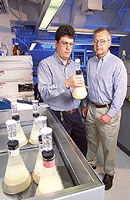In step with the Bush Administration’s call to increase the supply of alternative and renewable fuels nationwide, the U.S. Environmental Protection Agency today established the nation’s first comprehensive Renewable Fuel Standard (RFS) program, according to an EPA news release.
 At a press conference today, EPA Administrator Johnson, joined by Energy Secretary Samuel Bodman and National Highway Traffic Safety Administrator Nicole Nason, discussed the RFS program, increasing the use of alternative fuels and modernizing CAFÉ standards for cars.
At a press conference today, EPA Administrator Johnson, joined by Energy Secretary Samuel Bodman and National Highway Traffic Safety Administrator Nicole Nason, discussed the RFS program, increasing the use of alternative fuels and modernizing CAFÉ standards for cars.
“The Renewable Fuel Standard offers the American people a hat trick – it protects the environment, strengthens our energy security, and supports America’s farmers,” said EPA Administrator Stephen L. Johnson. “Today, we’re taking an important first step toward meeting President Bush’s “20 in 10” goal of jumping off the treadmill of foreign oil dependency.”
“Increasing the use of renewable and alternative fuels to power our nation’s vehicles will help meet the President’s Twenty in Ten goal of reducing gasoline usage by 20 percent in ten years,” Secretary Bodman said. “The Administration’s sustained commitment to technology investment will bring a variety of alternative fuel sources to market and further reduce our nation’s dependence on foreign sources of energy.”
“While we must look at increasing the availability of renewable and alternative fuels, we must also continue to improve the fuel efficiency of our passenger cars and light trucks,” said Nicole R. Nason, Administrator of the National Highway Traffic Safety Administration. “As a part of the President’s “20 in 10” energy security plan, we need Congress to give the Secretary of Transportation the authority to reform the current passenger car fuel economy standard.”
The RFS program will promote the use of fuels such as ethanol and biodiesel, which are largely produced from American crops. The program will create new markets for farm products, increase energy security, and promote the development of advanced technologies that will help make renewable fuel cost-competitive with conventional gasoline. In particular, the RFS program establishes special incentives for producing and using fuels produced from cellulosic biomass, such as switchgrass and woodchips.
Listen to the entire interview press conference.  RFS Press Conference (27:00 min MP3)
RFS Press Conference (27:00 min MP3)
 It comes as no surprise that the Renewable Fuels Association is very pleased with the Bush Administration’s Renewable Fuels Standard announced today.
It comes as no surprise that the Renewable Fuels Association is very pleased with the Bush Administration’s Renewable Fuels Standard announced today. 

 At a press conference today, EPA Administrator Johnson, joined by Energy Secretary Samuel Bodman and National Highway Traffic Safety Administrator Nicole Nason, discussed the RFS program, increasing the use of alternative fuels and modernizing CAFÉ standards for cars.
At a press conference today, EPA Administrator Johnson, joined by Energy Secretary Samuel Bodman and National Highway Traffic Safety Administrator Nicole Nason, discussed the RFS program, increasing the use of alternative fuels and modernizing CAFÉ standards for cars.
 “You don’t have to sacrifice the fun aspects of a car. All you have to do is change your fuel,” said Martin Tobias, CEO of Imperium Renewables, a biodiesel refiner that developed the Pimp My Ride biodiesel experiment with MTV. “It completely blew away the Lamborghini. It was only two-thirds down the track when the Impala crossed the finish line.”
“You don’t have to sacrifice the fun aspects of a car. All you have to do is change your fuel,” said Martin Tobias, CEO of Imperium Renewables, a biodiesel refiner that developed the Pimp My Ride biodiesel experiment with MTV. “It completely blew away the Lamborghini. It was only two-thirds down the track when the Impala crossed the finish line.” The
The  Racing Legend Bobby Rahal and Tony George, the CEO and Founder of the Indy Racing League, will be the featured guests at the
Racing Legend Bobby Rahal and Tony George, the CEO and Founder of the Indy Racing League, will be the featured guests at the  Officials in Monroe County, New York are working with
Officials in Monroe County, New York are working with  USDA Agricultural Research Service scientists at the Eastern Regional Research Center in Wyndmoor, Pa., are investigating ways to avoid overburdening the corn market as ethanol production expands.
USDA Agricultural Research Service scientists at the Eastern Regional Research Center in Wyndmoor, Pa., are investigating ways to avoid overburdening the corn market as ethanol production expands. As New Hampshire’s state legislature moves forward a proposal to study biodiesel production, distribution, and promotion in the state, the first commercial biodiesel plant is proposed.
As New Hampshire’s state legislature moves forward a proposal to study biodiesel production, distribution, and promotion in the state, the first commercial biodiesel plant is proposed.